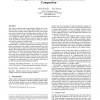162 search results - page 24 / 33 » Type-preserving garbage collectors |
IWMM
2007
Springer
14 years 2 months ago
2007
Springer
Past studies have shown that objects are created and then die in phases. Thus, one way to sustain good garbage collection efficiency is to have a large enough heap to allow many ...
PLDI
2006
ACM
14 years 2 months ago
2006
ACM
Constructing correct concurrent garbage collection algorithms is notoriously hard. Numerous such algorithms have been proposed, implemented, and deployed – and yet the relations...
IEE
2007
13 years 8 months ago
2007
: The memory management of distributed objects, when done manually, is an error-prone task. It leads to memory leaks and dangling references, causing applications to fail. Avoiding...
WOSP
2010
ACM
14 years 3 months ago
2010
ACM
For garbage-collected applications, dynamically-allocated objects are contained in a heap. Programmer productivity improves significantly if there is a garbage collector to autom...
PLDI
2006
ACM
14 years 2 months ago
2006
ACM
The widely used Mark-and-Sweep garbage collector has a drawback in that it does not move objects during collection. As a result, large long-running realistic applications, such as...


